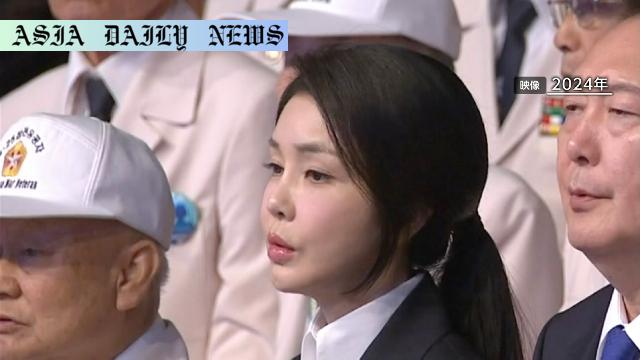Unification Church under investigation by South Korean authorities linked to a gift scandal involving ex-first lady.
- Special prosecutor investigates ties between Unification Church and ex-South Korean first lady.
- Inquiry delves into luxury gifts allegedly exchanged for favors.
- National Intelligence Service headquarters also raided.

Background of the Investigation
The Unification Church has long been a controversial religious organization in South Korea, but recent developments have thrust it into the spotlight once again. A special prosecutor has initiated a high-profile investigation to uncover potential ties between the religious group and the former first lady, Kim Keon-hee. This move is part of a broader inquiry into alleged corruption involving luxury gifts exchanged under questionable circumstances.
The investigation highlights allegations that a former high-ranking Unification Church official provided Kim with a luxury handbag and diamond necklace through an intermediary. These items, reportedly gifted in 2022 when Kim served as the first lady, have sparked debates on ethical conduct by public officials and their families. The special prosecutor is now assessing whether this transaction circumvents South Korea’s stringent laws banning the gifting of expensive items to individuals connected to public office.
Key Details Uncovered
South Korean media have suggested that the gift-giver sought favors in return, including assistance in securing governmental development funds for a Cambodia-based project connected to the Unification Church. Such allegations carry significant political and social implications, further exacerbating scrutiny of both Kim and the religious group. These claims have also brought attention to the legal and ethical boundaries blurred during Yoon Suk-yeol’s presidency.
Authorities are expanding the probe to include other entities potentially linked to the alleged corruption. The National Intelligence Service (NIS) headquarters was recently raided, signaling the broader scope of this investigation. The raid of the Unification Church’s main compound adds another layer of complexity as investigators sort through related evidence and testimony.
Ramifications and Public Reaction
This probe has generated widespread public interest, with many South Koreans demanding transparency and accountability. The investigation has amplified longstanding debates about the influence of religious organizations in political and governmental affairs. Additionally, the examination of the National Intelligence Service indicates the investigation’s gravity and the stakes involved.
As the case unfolds, critics argue that it reflects broader systemic issues within South Korea’s political landscape, where powerful figures are often accused of cultivating inappropriate relationships with influential organizations. Meanwhile, proponents of the investigation emphasize its necessity for upholding justice and maintaining ethical standards for public officials and their families.
Broader Implications
At its core, this investigation is not merely about isolated corruption but about the pervasive influence of institutions such as the Unification Church. The group, noted for its deep-rooted presence in South Korea, has faced accusations over the years, ranging from controversial financial activities to political influence. The recent allegations against Kim Keon-hee have further strained public perceptions of religious groups interfering in state matters.
This case underscores the ongoing effort to address corruption allegations among South Korea’s elite. Beyond the immediate ramifications for individuals involved, the investigation could serve as a turning point in limiting the overreach of certain organizations in governmental affairs. For the nation’s citizens, this case is a reminder of the need for vigilance and accountability at all levels of society.



Commentary
The Role of Justice in High-Profile Investigations
The raid on the Unification Church and subsequent investigations into the former first lady, Kim Keon-hee, provide a critical lens through which to assess the integrity of South Korea’s political and religious institutions. Given the nature of the allegations, this case has not only raised concerns about potential corruption but also the undue influence of powerful organizations on governmental processes.
At its heart, this investigation is emblematic of a society striving to balance tradition, influence, and the rule of law. The wealth and power wielded by groups such as the Unification Church have allowed them to operate in a space often immune to scrutiny. However, cases such as this highlight the need to dismantle these barriers and ensure fairness in judicial processes, irrespective of the people or organizations involved.
Public Accountability as a Bedrock of Democracy
South Koreans have historically shown resilience and an unyielding demand for accountability, and this case exemplifies that spirit. The allegation that luxury gifts were provided in hopes of securing governmental favors is concerning as it challenges the ethical integrity of public office. For a democracy to thrive, transparency must be its cornerstone.
Beyond just addressing corruption, this investigation offers the opportunity for systemic reforms. It beckons the South Korean government and judiciary to establish stronger measures to ensure stricter checks on how individuals in power interact with influential organizations, both religious and otherwise. This case may set precedents that could ripple across Southeast Asia.
Hope for Transparency and Ethical Governance
As the investigation unfolds, it sets the stage for greater public awareness and scrutiny. While high-profile cases of corruption are often polarizing, they also force both individuals and institutions to reflect on the ethical frameworks guiding their actions. The case against the Unification Church and Kim Keon-hee demonstrates the importance of accountability at all societal levels.
Ultimately, this controversy offers an opportunity for South Korea to affirm its commitment to justice and transparency. The outcome of this case will not only influence public opinion but also shape how such matters are handled in the future, fostering hope for ethical governance.